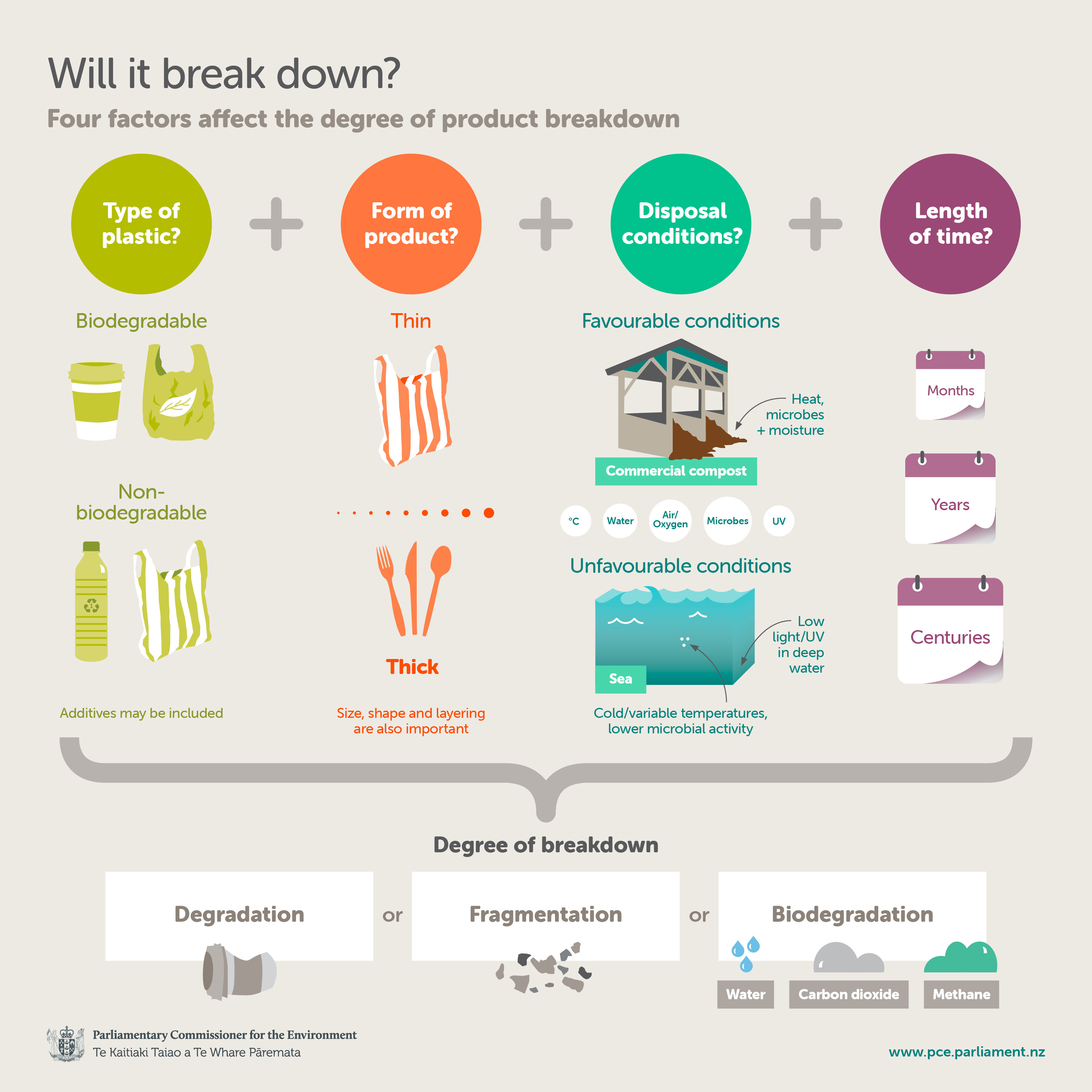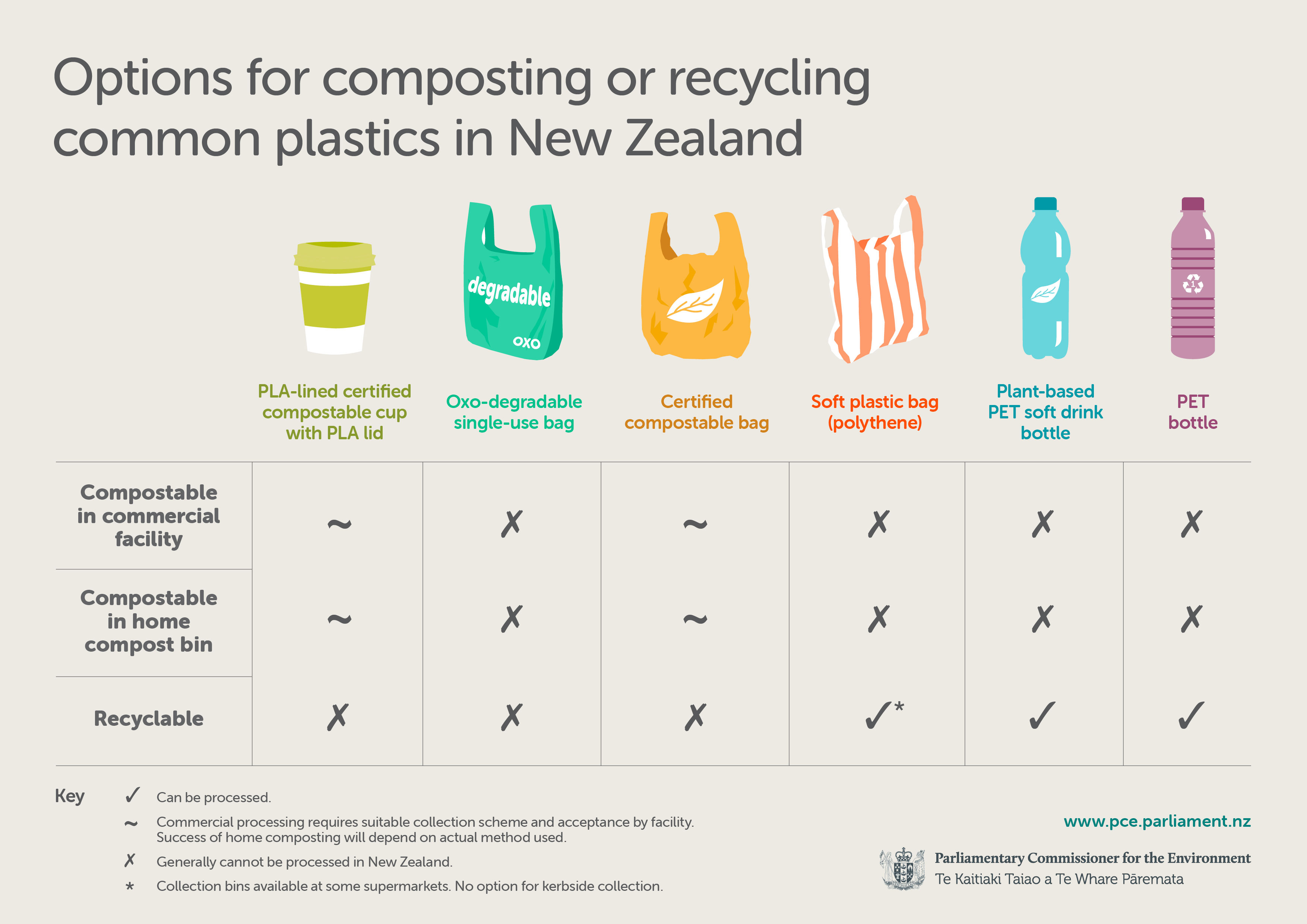The Parliamentary Commissioner for the Environment has tasked the Government with clearing up the confusion around environmentally friendly plastics.

The Commissioner has released an online resource to help concerned consumers tackle the complexities of the issue, but he says the Government needs to step in and assume greater responsibility.
The online resource and infographics – which can be used with attribution – can be found here.
The Science Media Centre gathered expert commentary about what steps consumers can take, please feel free to use these comments in your reporting.
Paul Evans, Chief Executive, Waste Management Institute New Zealand, comments:
“There is significant confusion among retailers and consumers around terminology where words like biodegradable, degradable and compostable are used interchangeably but they actually mean very different things.
“Many consumers have purchased bags thinking they’ve bought something compostable only to find out it’s actually degradable – so sorting out these terms is actually very important.
“That’s why standards and labels are so vital in allowing consumers to make informed decisions. At the moment there are a plethora of standards and manufacturers are creating their own labels which only adds to the confusion.
“My main advice to consumers is: no single-use option is a good choice.
“There may be some which lessen the environmental effect to some degree – but ultimately they all have an impact. First and foremost people need to consider how they can reduce their consumption and then use reusable products where they can.
“As much as we need to get better guidance on the materials we use, we actually need to change our behaviour and make better choices.”
Conflict of interest statement: I was one of a number of stakeholders the PCE interviewed. We received no payment for our contribution.
Dr Elspeth MacRae, General Manager Manufacturing & Bioproducts, Scion, comments:
“The commentary by the Parliamentary Commissioner for the Environment giving clarity for the public on the confusing issues of biodegradability and compostability of plastics is welcome.
“Many people misunderstand that single use plastics are necessary for safety for food and health, providing protection from contamination and wastage.
“Biobased plastics – i.e. those made from biological resources comprise <1% at most of the total plastics industry, but this is a growth area as materials such as PLA and PHAs become more widely applicable and cheaper to produce. It has been predicted that production of biobased plastics will increase by to $30B in trade by 2020 in a plastics market worth $650B by 2020.
“As the Commissioner rightly points out, you can’t assume a biobased plastic is biodegradable, and that a petroleum-based plastic is not. Biodegradable plastics are those that microbes break down to water and CO2 (or methane in some circumstances), and examples are found in both petroleum and biobased plastics.
“Packaging plays an extremely important role in creating New Zealand’s wealth and is important in supporting the global sale of products. In New Zealand, the packaging industry has a value over $4B per annum in sales, supports more than $32B in agribusiness exports and $58B in internal New Zealand trade, and employs more than 48,000 people. Plastics are an important part of packaging, but we can reassess what plastics we use for what purpose.
“There has been a growth in New Zealanders looking at redesigning packaging to fit ‘end-of-life’ needs. This includes recycling, composting for the right packaging, and reuse due to clever packaging design. Currently, packaging also gives information to consumers and allows tracking of the history of the product within. This is increasingly important in our export markets.
“Plastics are very important as light weight and design-for-purpose materials, this is just another evolution in what we can do with plastics and should do with plastics.
“This is a complex area and we are pleased to see it being elevated for public debate. Language matters – biodegradable and compostable are not the same and biobased is not the same either.
“We need to look for more ways we can signal to the public via standards or logos what they are buying and what they can do at the end of life. New Zealand needs more formal recycling and/or composting facilities and to learn to operate like many countries in Europe.”
Conflict of interest statement: Board member of Packaging New Zealand
Professor Thomas Neitzert, Professor of Engineering, AUT; President of Engineers for Social Responsibility, comments:
“The Commissioner for the Environment raises a number of valid points in highlighting the confusion around biodegradability and compostability of plastics.
“Even the existing international standards are not much help and there is a general lack of knowledge of the impact of plastics on the environment and humans. Certainly more work and research needs to be done.
“In the meantime, the principle of caution should be applied. If we are not sure, what kind of plastic with what kind of properties we are holding in our hands, then just don’t touch it.
“In many cases, we have alternatives through other materials like metals, glass and textiles. If consumers refuse plastics and switch to alternatives, then certain industries are on the back foot to explain the safety of their products. This is one way to achieve product stewardship.”
Conflict of interest statement: None.
Dr Ivanhoe Leung, Senior Lecturer at the School of Chemical Sciences and co-Deputy Director of the Centre for Green Chemical Science, University of Auckland, comments:
“I welcome the letter by the Parliamentary Commissioner for the Environment. The four areas that the Commissioner has identified around biodegradable plastics are sound and logical. In particular, I think there is an urgent need for local end-of-life infrastructure so that we will not be over-reliant on third countries (e.g. China) to handle our recyclable materials.
“There is also a massive opportunity for New Zealand, especially in the upcycling of broken-down plastic materials (e.g. conversion into useful starting materials for the chemical industry). This is an area of active research in industry and academia alike, and New Zealand has several world-leading researchers who work in this area.
“Retailers and manufacturers can drive changes in consumer behaviours and habits. Recent changes about phasing out single-use plastic bags and plastic straws and by providing drop-off points for old plastic bags inside supermarkets will help reduce the amount of plastic waste that is going to landfill.
“Supermarkets can (and should) also provide drop-off facilities for recycling other plastic materials (e.g. bottles). When recycling, consumers should also pay attention to the types of plastics (numbered 1 to 7) that they are handling. These numbers can always be found, for example, moulded into plastic bottles. This is important as some recycling facilities only accept certain types of plastics for recycling.”
No conflict of interest.
